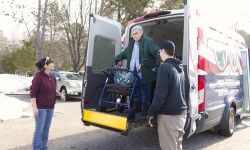Despite COVID spike, Whitmer mulls allowing more fans for Detroit Tigers

Update: Whitmer: COVID tests for student athletes, but more fans for Detroit Tigers
LANSING — Schools have reopened, restaurants are back in business and thousands of baseball fans could soon get to enjoy an annual spring tradition: Detroit Tigers’ Opening Day.
One year and a week after Michigan confirmed its first case of COVID-19, a massive vaccination effort is driving the state toward something approaching normal.
The latest: Michigan coronavirus unemployment, map, curve, updated COVID-19 news
But health experts warn the promise of herd immunity is still months away. And after a precipitous decline in December, January and February, Michigan is now seeing one of the fastest increases in daily coronavirus cases in the nation.
Related: No doubt: Third surge of COVID has hit Michigan. Can we vaccinate fast enough?
“It’s a very dangerous time, because ... (more) people are vaccinated, but people are letting their guard down and not masking and not social distancing,” said Dr. Teena Chopra, an infectious disease specialist with Wayne Health and Wayne State University.
“There is a lot of pandemic fatigue.”
Democratic Gov. Gretchen Whitmer has faced a barrage of criticism from Republican lawmakers who contend Michigan’s ongoing COVID-19 restrictions are crippling the economy, small businesses and their employees.
Dashboard: Michigan coronavirus testing numbers, trends, COVID-19 data
But Whitmer has gradually eased regulations since Feb. 1, when she ended a two-month “pause” on indoor dining, and is now considering whether to ease a 1,000-fan limit in time for Detroit Tigers’ Opening Day on April 1.
Whitmer spokesperson Bobby Leddy said Monday the state health department has been in “close contact” with the Tigers and Comerica Park “to find a safe path forward to expand capacity limits at the stadium.”
The outdoor venue seats more than 41,000 fans, and the current capacity limits make no sense, according to GOP legislators who gathered outside the empty stadium Monday morning and urged Whitmer to ease the rules.
“For God’s sake, just let us have some fun for once,” said state Rep. Matt Maddock, R-Milford.
But the push comes as COVID-19 case counts climb again, reversing what had been a sharp decline in January and February. Just 10 days ago, Michigan had the 43rd highest rate of new cases nationally; it now stands at 7th and is one of the four states seeing daily cases per 100,000 rise the fastest.
Michigan has also seen its weekly percentage of positive coronavirus tests jump from 3.4 percent on March 1 to 5.5 percent on Monday.
As cases have risen, so, too, have hospitalizations: the state said 1,094 people were being treated for confirmed or suspected COVID-19 on Monday, the first time in a month that those figures topped 1,000.
“We’re also seeing these variants in Michigan, and I think if we let our guard down at this time there could be another surge,” Chopra said, referencing highly contagious strains that originated in the United Kingdom and South Africa.
The virus is also still spreading at a faster rate in Michigan than it was in late July, when the Detroit Tigers began an abbreviated 2020 season that was played entirely without fans under protocols developed by Major League Baseball.
Outdoor gatherings are less risky than indoor events, but if the state allows thousands of people into baseball stadiums, those fans might also crowd into smaller places like bathrooms and local restaurants, increasing the chance for transmission, Chopra said.
A bigger concern, she noted, is that some people are simply “not very good at masking,” which makes any gatherings inherently more dangerous. “A lot of times we see masks and the nose is not covered. (And that’s) almost like you’re not wearing a mask,” Chopra said.
Not all states have finalized policies for the upcoming Major League Baseball season, but Michigan’s current limits would leave Comerica Park as the most empty in the nation, according to data compiled for Forbes.com.
Illinois, for instance, is allowing 20 percent capacity for Cubs and White Sox games, which is 8,274 fans in Wrigley Field and 8,122 fans at Guaranteed Rate Field, respectively. Ohio is allowing 30 percent capacity, or 10,500 fans at Progressive Field in Cleveland.
Under local rules, 2,000 fans are currently allowed at Tigers’ spring training games at the 9,000-seat Joker Marchant Stadium in Lakeland, Florida.
Maddock, a conservative lawmaker from Oakland County who does not wear a mask to work in the Michigan Capitol, suggested Whitmer should “start at 50 percent” capacity, which would allow more than 20,000 fans inside Comerica for the Opening Day game.
Whitmer’s office gave no indication of how far it might go, but “given our success” during the restaurant shutdown lifted Feb. 1 “and expansion of vaccine eligibility, we feel confident that our state is making tremendous strides to get back to normal as quickly as possible,” Leddy said.
“There’s nothing more exciting than fans rooting for the Tigers at a home game, and we look forward to making that happen very soon.”
Health department spokesperson Lyn Sutfin told Bridge Michigan that conversations about capacity at Comerica Park and other stadiums are “ongoing.”
“As always, we consider percent positivity, case rates and hospitalization rates,” Sutfin said in an email. “Also, the size of a venue and if it is an indoor or outdoor facility can factor into decisions. Additional information will be available once any decisions are made.”
As of Friday, more than 1 million Michigan residents were fully vaccinated, and another 840,000 had received the first of two required shots. The Whitmer administration last week announced all adults will be eligible for a vaccine April 5 — four days after the Tigers’ first home game.
There is a “very realistic” chance that 80 percent of Americans will be fully vaccinated by June, Chorpra said, calling Whitmer’s plan feasible. “But if we let our guard down” before then, “we will give a chance to the virus to multiply and mutate and develop more variants by more transmission,” she said.
Republicans who demonstrated outside of Comerica Park on Monday acknowledged Whitmer is likely to ease stadium capacity limits by Opening Day, but they argued the current cap is arbitrary and emblematic of “onerous” Michigan regulations that are out of line with other states.
“Trust us, governor,’ said Rep. TC Clements, R-Temperance. “Trust us to make decisions. Trust us to be responsible, and like the other states in this nation, please allow the economic train that was moving before March 2020 to get back on track.”
Sen. Adam Hollier, a Detroit Democrat, said legislators should “get out of the habit and the business of giving public health advice.”
The Legislature should be focused on making sure those health officials have the resources they need to do their jobs, he said, accusing Republicans of “playing politics” by withholding federal relief funds.
“I trust the governor to follow the guidance, and the local health department in Detroit, to do what they believe is safe,” Hollier said.
Whitmer has already relaxed many of the regulations Republicans have criticized. And last week, she signed a spending bill that will make $136 million in COVID relief funding available to schools that offered at least 20 hours of in-person instruction a week, a top priority for the GOP.
While the governor has resisted calls to make in-person instruction mandatory, she recommended every district reopen classrooms by March 1.
About 97 percent of traditional school districts met that goal by having classrooms open for at least part of the week. Several others were expected to resume at least some in-person instruction this month. Only Kalamazoo Public Schools has announced plans to remain fully virtual this school year.
Business groups are also urging the Whitmer administration to relax rules for in-person office work, but the state says office spaces remain risky and have been linked to 275 outbreaks over the past six months.
Under current occupational safety rules, Michigan employers are supposed to keep their offices closed and allow remote work whenever feasible. That policy is set to expire April 14 but is likely to be extended beyond that date as a new work group convenes to develop recommendations for Whitmer.
“Indoor office areas are very small and most offices don’t have good ventilation,” Chopra said. “I agree that slowly we have to open up, but it cannot just be a switch.”
Public health officials are also concerned about large St. Patrick’s Day parties on Wednesday. Ingham County Health Officer Linda Vail recently issued an emergency order limiting outdoor gatherings to 15 people in student neighborhoods near Michigan State University in East Lansing.
“It is critical to keep social gatherings small,” Vail said in a statement. “We are making excellent progress in fighting COVID-19 but we do not want to take steps backward.”
Mike Wilkinson contributed to this report.
See what new members are saying about why they donated to Bridge Michigan:
- “In order for this information to be accurate and unbiased it must be underwritten by its readers, not by special interests.” - Larry S.
- “Not many other media sources report on the topics Bridge does.” - Susan B.
- “Your journalism is outstanding and rare these days.” - Mark S.
If you want to ensure the future of nonpartisan, nonprofit Michigan journalism, please become a member today. You, too, will be asked why you donated and maybe we'll feature your quote next time!




